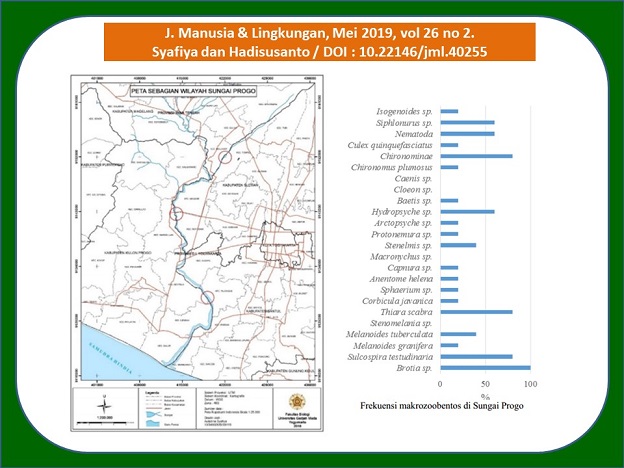
KOMUNITAS MAKROZOOBENTOS DI KAWASAN PENAMBANGAN PASIR DI SUNGAI PROGO (Macrozoobenthos Community in Sand Mining Area of Progo River)
Auladina Syafiya(1*), Suwarno Hadisusanto(2)
(1) Fakultas Biologi, Universitas Gadjah Mada, Sekip Utara, Yogyakarta, 55281.
(2) Fakultas Biologi, Universitas Gadjah Mada, Sekip Utara, Yogyakarta, 55281.
(*) Corresponding Author
Abstract
Sungai memiliki peranan penting bagi manusia dan makhluk hidup lainnya, di antaranya adalah sebagai habitat bagi komunitas makrozoobentos dan pemanfaatan material berupa pasir dan batu sebagai bahan bangunan. Sungai Progo merupakan salah satu sungai yang hampir di sepanjang sungainya terdapat aktivitas penambangan pasir. Jika aktivitas ini dilakukan terus menerus dalam jumlah banyak dan tanpa pengawasan yang baik dapat menyebabkan terjadinya erosi dan degradasi serta sedimentasi pada bagian-bagian tertentu sungai. Maka dari itu dilakukan penelitian ini untuk mempelajari pengaruh aktivitas penambangan pasir terhadap distribusi dan kemelimpahan komunitas makrozoobentos di Sungai Progo, serta Functional Feeding Group (FFG) yang paling melimpah dan parameter fisiko-kimia yang memengaruhinya. Penelitian ini dilakukan dalam tiga tahap, yaitu mencuplik dan preparasi sampel makrozoobentos, identifikasi sampel, dan pengukuran parameter fisiko-kimia. Aktivitas penambangan pasir di Sungai Progo berpengaruh secara tidak langsung terhadap makrozoobentos, yaitu dengan menyebabkan adanya erosi dan degradasi di kawasan penambangan pasir serta sedimentasi di bagian hilir. FFG makrozoobentos di Sungai Progo yang paling melimpah adalah tipe scraper dan collector. Berdasarkan analisis regresi dan korelasi Pearson didapatkan hasil bahwa fosfat berkorelasi positif terhadap densitas makrozoobentos di bagian hulu Sungai Progo, intensitas cahaya berkorelasi positif terhadap densitas makrozoobentos di bagian tengah Sungai Progo, dan kecepatan arus berkorelasi positif terhadap densitas makrozoobentos di bagian hilir Sungai Progo.
Abstract
River has an important role for human and other organisms, among them are as habitat of macrozoobenthos community and the utilization of the material, such as river sand and gravel for building material. Progo River is one of rivers which have sand mining activities almost all along the river. If this activity being done continuously, in a big amount and without a good supervision, it could lead to erosion, degradation and sedimentation in some specific parts. Therefore, this research has an aim to study the effects of sand mining activity towards the distribution and the abundance of macrozoobenthos community in Progo River, and also to study which Functional Feeding Group (FFG) is the most abundant and the physic-chimic parameter that affecting them. This research was conducted in three steps, sampling and preparation of macrozoobenthos’s sample, sample’s identification, and the measurement physicochemical parameter. Sand mining activity in Progo River effect indirectly towards macrozoobenthos by causing erosion and degradation in sand mining area as well as sedimentation in downstream. The most abundant FFG of macrozobenthos in sand mining area of Progo River are scraper and collector. Based on regression and Pearson correlation analysis the results show that phosphate correlated positively against the density of macrozoobenthos in the headwaters of Progo River, light intensity correlated positively against the density of macrozoobenthos in the midstream of the Progo River, and current velocity correlated positively against the density of macrozoobenthos in the downstream of the Progo River.
Keywords
Full Text:
PDFReferences
Callisto, M., and Graça, M.A.S., 2013. The Quality and Availability of Fine Particulate Organic Matter for Collector Species in Headwater Streams. International Review of Hydrobiology, 98(3):132-140.
Hendarti, L.M., 2007. Menepis Kabut Halimun: Rangkaian Bunga Rampai Pengelolaan Sumberdaya Alam. Yayasan Obor Indonesia. Jakarta.
Ikhsan, J., Pratama, R.B., dan Harsanto, P., 2015. Kajian Kegiatan Penambangan Pasir dan Dampaknya terhadap Dasar Sungai di Kali Progo Hilir Pasca Letusan Merapi tahun 2010. Sumber Daya Air, 9:291-296.
Isnaningsih, N.R., dan Listiawan, D.A., 2010. Keong dan Kerang dari Sungai-sungai di Kawasan Karst Gunung Kidul. Zoo Indonesia, 20(1):1-10.
Kelly, C., Mitrasetia, T., and Sugardjito, J., 2017. An Assessment of A Tropical Urban Stream Using Benthic Macroinvertebrates as A Bio-indicator in Muara Angke, Jakarta, Indonesia. Bonorowo Wetlands, 7(2):65-73.
Magfirah, Emiryati, dan Haya, L.O.M.Y., 2014. Karakteristik Sedimen dan Hubungannya dengan Struktur Komunitas Makrozoobentos di Sungai Tahi Ite Kecamatan Rarowatu Kabupaten Bombana Sulawesi Tenggara. Jurnal Mina Laut Indonesia, 14(4):117-131.
Marwoto, R.M., dan Isnaningsih, N.R., 2012. The Freshwater Snail Genus Sulcospira Troschel, 1857 from Java, with Description of A New Species from Tasikmalaya, West Java, Indonesia (Mollusca: Gastropoda: Pachychilidae). The Raffles Bulletin of Zoology, 60(1):1-10.
Muntalif, B.S., Chasanah, N., dan Faza. M.F., 2016. Relationship Population Density of Aquatic Sediment Macrozoobenthos to River Water Quality Parameters: Case Study of Upstream Citarum River in Bandung Regency. Journal of Environmental Science and Engineering, 5:117-125.
Pinder, L.C.V., 1986. Biology of Freshwater Chironomidae. Annual Review of Entomology. 31:1-23.
Rabett, R.J., 2012. Human Adaptation in the Asian Paleolithic. Cambridge University Press. Cambridge.
Waples, J.T., Bootsma, H.A., and Klump, J.V., 2017. How Are Coastal Benthos Fed. Limnology and Oceaongraphy, 2:18-28.
Article Metrics
Refbacks
- There are currently no refbacks.
Copyright (c) 2020 Jurnal Manusia dan Lingkungan

This work is licensed under a Creative Commons Attribution-ShareAlike 4.0 International License.







